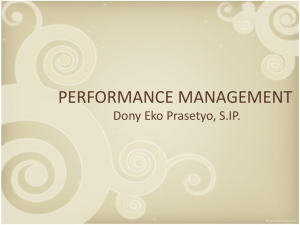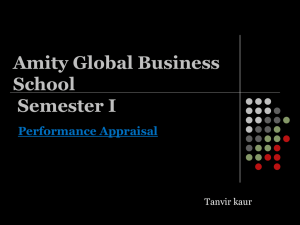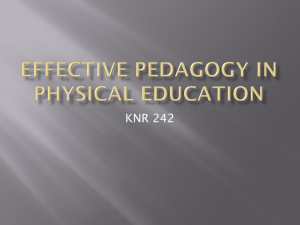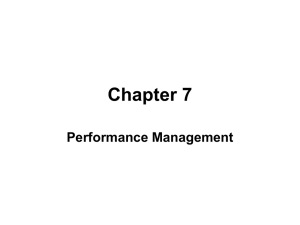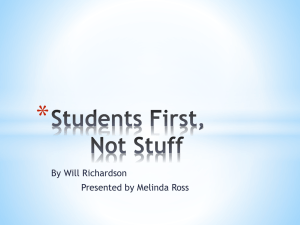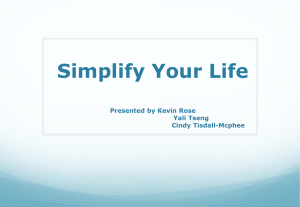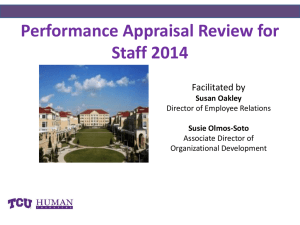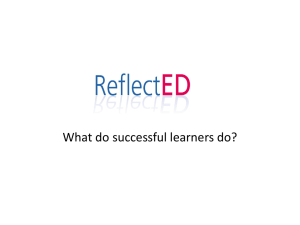Teachers Appraisal Workshop Three PP Participants` copy
advertisement
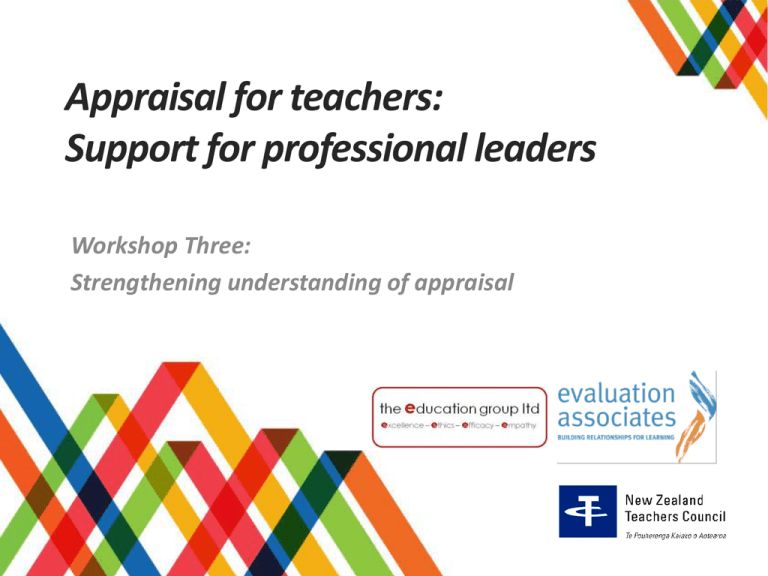
Appraisal for teachers: Support for professional leaders Workshop Three: Strengthening understanding of appraisal Haere mai Ma whero ma pango ka oti ai te mahi. Workshop Three Component One Strengthen understanding of what appraisal is all about Component Two Strengthen Personal Skills in Open to Learning conversations Strengthen the culture for open to learning conversations Component Three Strengthen strategies to implement effective appraisal processes – deepening the ongoing culture of learning in our settings ` Conceptual Framework for Appraisal •Trust •Valid information •Commitment to action •Inquiry into practice Open to learning conversations Evaluative Capability Performance Management Responsibility Whanaungatanga Wānanga •Alignment •Professional growth Ako •Self •Joint/shared Manaakitanga Tangata whenuatanga Ako Overview of the day 1. 2. 3. 4. Evaluation feedback Sharing models and processes of appraisal (within and across settings) - share the results, the successes and the issues still to be further worked on Your appraisal . What is the process? How does it link to the conceptual frame? Strengthening the culture of learning within your setting including: • • Evidence of practice Goal setting, 5. Afternoon choices: • Inquiry plans • Upskilling appraisers Meaning making and application to your setting at each stage What has the evaluation told us so far? To what extent has your appraisal system been changed? Answer Options No change Minor changes only Response Count 2 60 Change some aspects 227 Make significant changes 145 Completely remodel 49 Changes Settings have included new components into performance management processes as a direct outcome of participating in the contract. Examples include: • • • • • • • • • Indicators criteria to show what good practice looks like Peer appraisal School Professional Learning Groups (PLGs) Peer observations and feedback E-portfolios Reflective journals Teacher portfolios Feedback from learners Using video evidence The extent to which participants agree with the statement Teachers set sufficiently challenging goals for themselves 400 360 320 280 240 200 160 120 80 40 0 104 12 strongly agree 33 114 95 99 39 11 strongly disagree Most appraisers have the necessary skills for rigorous evaluation 400 360 320 280 240 200 160 120 80 40 0 96 61 6 strongly agree 29 97 115 76 31 strongly disagree Sharing models and processes of appraisal So if effective appraisal is what we are aiming at, how far have you got? • • • • Alignment of systems and processes Developing evaluative capability in your place Strengthening an open to learning culture Promoting self and joint responsibility Your own appraisal (think about Professional Standards and the RTCs) Work with someone who has similar responsibilities as you. Talk about your process for your own appraisal: • To what extent does your process parallel the process used for your staff? • What , if anything, needs to be different? • To what extent does it reflect the conceptual frame for appraisal So if effective appraisal is what we are aiming at, how far have you got? Appraisal components Appraisal Report •Overall evaluative judgements/statements •Key strengths •Next steps/concerns •Support to be provided Performance Management •Renewal of registration ( every 3 years) •Attestation (annual for pay progession) •Appraisal (annual for growth and development) linked to learner outcomes •Alignment to Tātaiako Appraisal Discussions Process: •Interpreting evidence •Affirmation •Feedback •Next steps •Criteria established •Goal setting •Indicators of success identfied •Timeframes and actions identified •Support to be provided Evidence Collected (learning portfolio) •Teaching as Inquiry •Observations /feedback •Evidence of learning(teacher/learner) •learner voice •Informal feedback •Contribution to wider school feedback from other staff Teachers council resources Alignment of RTCs and Professional Standards Evidence of practice that demonstrates the RTCs Examples of practice Which RTC could you explore with the teacher based on the example? Analysing the example of practice: significant content How does this meet the RTC/Tataiako? Reflection: What does this mean for next steps teaching and learning? Identification: What stands out? Where are the patterns? For me, my group of akonga and individual akonga/priority learners? From everyday practice: What is available as evidence? Evidence : A range of sources and perspectives Sources Learner outcomes, RTCS and Tātaiako Compilation of examples of practice over time Perspectives What evidence of meeting the RTCs would the teacher bring to the appraisal discussion? Check this against the sources of evidence triangle What might I do with my evidence? I need to: • Know where the evidence can be found (planning, assessment information…) • Compile some of it in some way to show my learning over time (sound bites, video, photos, notes) I can: • Map it to the RTCs/Tātaiako/ our school indicators of effective practice • Bring the evidence I have to an appraisal meeting • Talk about my practice and its effect on my learners • Affirm what is going well and identify my learning needs Morning Tea Setting goals that will change my practice and improve outcomes for my learners Current practice How do you set goals in your setting? What are goals based upon? Share the examples you have brought along Linking goals to strategic direction Strategic direction Appraisal Teacher Inquiry into practice Annual plans/targets Professional learning An inquiry minded approach What are the priorities for my priority learners? How are they going in relation to these priorities? What are my learning needs? What therefore are my learning goals? What effect did it have on me as a teacher? Using evidence What effect did my changed teaching have on outcomes for my learners? Planning and participating in professional learning Changed teacher knowledge and actions SELF-DIRECTIVE Listen Discovery Empathise Clarify Ask questions Share opinions Inform Provide guidance Give advice Tell DIRECTIVE Informing Self awareness/perception (What I know about myself) I know Others know Perceptions and views of others Others don’t know I don’t know Self and joint responsibility Awareness • growing awareness changes the game. It moves us from being acted upon to being in a position to act on the issue or challenge. Responsibility • commitment and performance arises from choice • taking responsibility and ownership for change In your PLGs discuss What evidence might teachers use to identify the learning needs of their learners and consequently for themselves? How would you help a teacher to discover their blind spot? Goal… When setting goals a clear and motivating endpoint in relation to the needs of priority learners must be identified by the teacher and appraiser. Sloth Goals S omewhat vague L ack commitment O pen ended Timid H ard to achieve © growth coaching international ISMART Inspiring Specific Measurable Achievable Results driven Time-bound A goal framing By........ (timeframe) I am/have........ (changed practice) With the intention that/so that........ (learner outcomes/benefits) Smarter goals Using the goal frame how might these general intentions be expressed as smarter goals 1. I want my teachers to do a better job of teaching as inquiry 2. I want my teachers/learners to be more independent 3. I want my learners to be able to socialise with each other 4. I want all of my learners to accelerate their learning in reading 5. I want the learners at this school to choose my subject for NCEA 6. My assessments and planning will show how I am meeting the needs of my learners 7. My assessments will capture the continuity and complexity of learning 8. Your choice… Demonstration - goal setting session Do the goals reflect… 1. The learning needs of learners? 2. The learning needs of teachers? 3. The outcome that will be achieved if the goal, is met? Lunch Inquiry into practice group Achieving my goals Where • Learner needs am I • My teaching today? practice How will I get there? • What do I need to do to achieve my goals? Where am I going? What will the outcome be if I achieve my goal, for me and the learners in my class? The key questions for the focusing inquiry are: What is important (and therefore worth spending time on), given where my learners are at? What strategies (evidence-based) are most likely to help my learners learn what they need to learn? What will I notice about my changed practice and the impact on my learners? Inquiry is about problem solving (an evaluative process) 1. 2. 3. 4. 5. 6. What is the outcome I am striving to achieve with my learners? What is the criteria for success? How will I know I am meeting the criteria? What evidence do I have? How will I gather the evidence? What is the relationship between what I am striving to achieve and my current practice? 7. What do I need to do about that? An inquiry minded approach What are the priorities for my learners? How are they going in relation to these priorities? What are my learning needs? What therefore are my learning goals? What effect did it have on me as a teacher? Using evidence What effect did my changed teaching have on outcomes for my learners? Planning and participating in professional learning Changed teacher knowledge and actions What evidence will I collect about my changed practice and how can I use it demonstrate my competence? Sources Learner outcomes, RTCs, Tātaiako Compilation of examples of practice over time Perspectives Secondary school example Discussing learner learning and achievement in appraisal conversations Group Two: Upskilling appraisers in your setting What skills do appraisers need? Key Understandings 1. Understanding of RTCs /Tātaiako and what effective practice looks like 2. Understanding of the concept and principles that need to underpin appraisal 3. Knowledge of the setting’s strategic direction and targeted valued learner outcomes 1. Understanding of robust inquiry into practice processes Technical Skills Interpretation of achievement data/ learner progress Observation skills Goal setting skills Feedback skills Open to learning skills Coaching skills Fronting issues skills Report writing Personal skills Builds relational trust Maintains respect for self and others (maintain relationship and progress the task) Eliminates judgemental thoughts (no assumptions) Is present Listens actively Empathises Clarifies/paraphrases Is succinct Asks the best questions e.g. to test assumptions and beliefs (own and others) Gives honest and constructive feedback An inquiry minded approach What are the priorities for my learners? How are they going in relation to these priorities? What are my learning needs? What therefore are my learning goals? What effect did it have on me as a teacher? Using evidence What effect did my changed teaching have on outcomes for my learners? Planning and participating in professional learning Changed teacher knowledge and actions Problem solving What can you do to upskill your appraisers? Think about the workshop material – how might you use the material? What ongoing support would be helpful? Make a plan Full group back together Final phase of project Webinar/resources will be available online Meet with your PLG to work together to: 1. Develop plans to upskill appraisers in your setting • Think about how you can use the material from this project to support you in this process 2. Strengthen goal setting and inquiry across your setting Evaluation survey – end of May For ongoing support Make contact with: Teachers Council for appraisal support, induction and mentoring, registration support and resources http://www.teacherscouncil.govt.nz/ The Education Group for Growth Coaching and appraisal support www.educationgroup.co.nz Evaluation Associates for Open to Learning and appraisal support www.evaluate.co.nz ECE Professional Support, University of Auckland for Open to Learning, appraisal and professional learning and development support. http://www.education.auckland.ac.nz/uoa/home/about/professionaldevelopment/ecps

